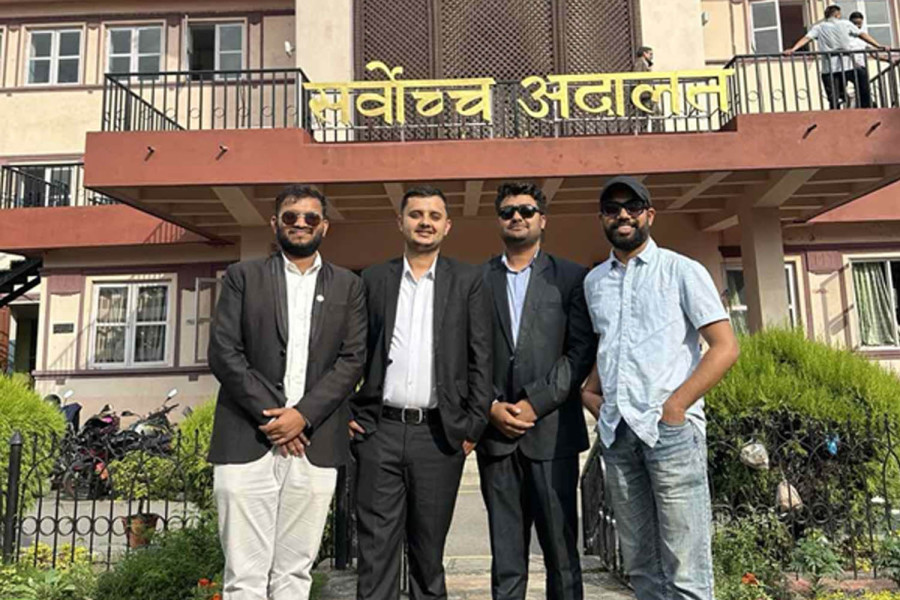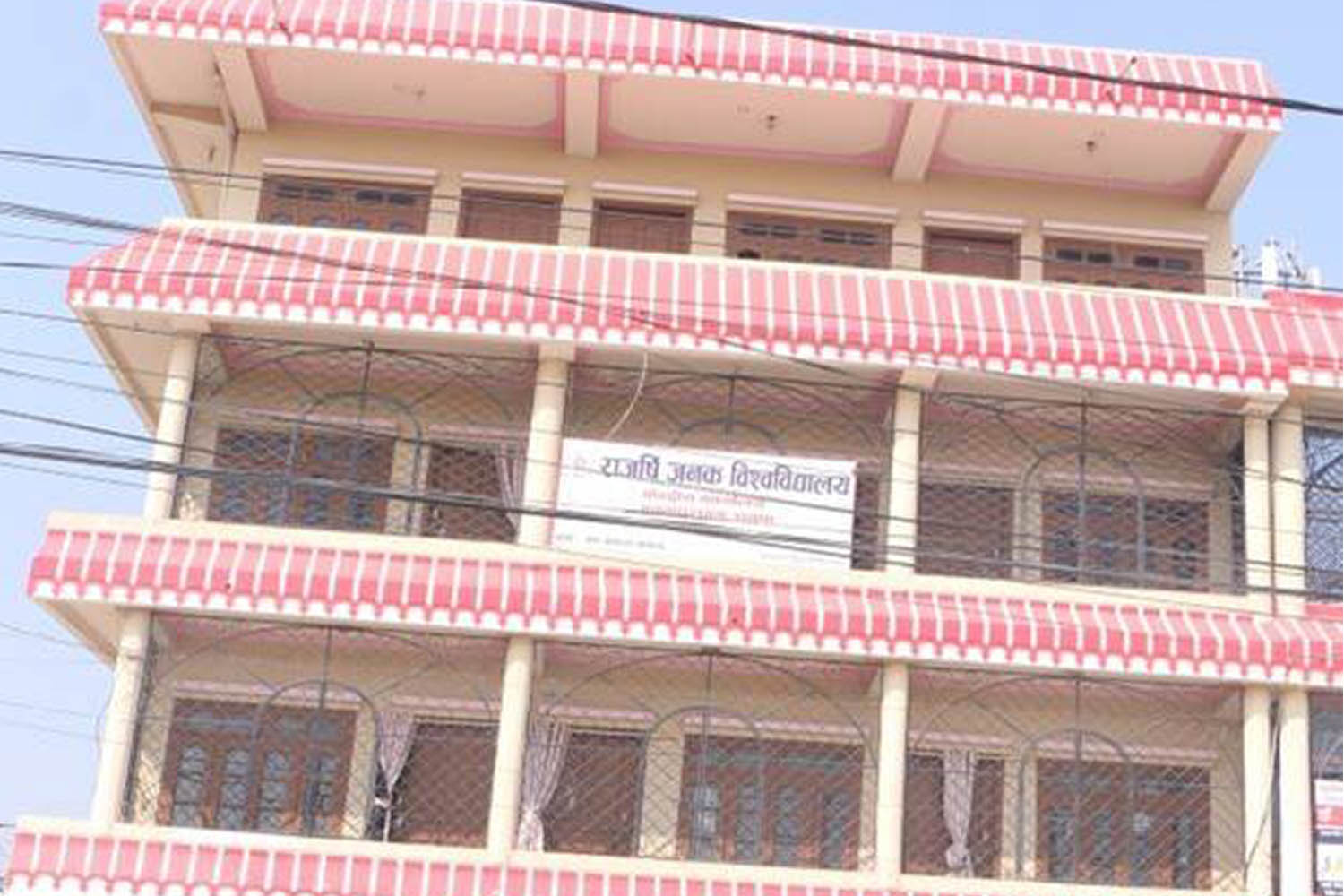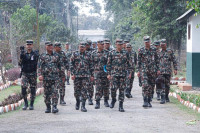National
Why a group of students don’t want new law colleges in Nepal
In late August, Rajarshi Janak University approved the opening of 15 law colleges. A team of students has decried the move saying it’s business-oriented.
Ellie Davis
In theory, a big investment in Nepal’s legal education would thrill current law students and teachers. However, a group of students is currently fighting the opening of new law colleges.
On August 29, Rajarshi Janak University, based in Janakpur, approved the opening of 15 affiliated law colleges throughout the country—a change that would nearly double the number of law schools in Nepal.
The law students see the move as a business scheme that will degrade the quality of legal education. Therefore, with their former teachers as legal counsel, the students filed a public interest lawsuit to stop the new schools from opening without the proper quality assurance.
“The problem is that Rajarshi Janak Campus is itself a struggling college,” Sujal Pokhrel, a student at Kathmandu University School of Law, said. “Rather than quality education, they are focusing on quality money and wealth.”
According to attorney Surendra Bhandari, one of the many lawyers representing the proposed law colleges, the lawsuit is a ploy from established law colleges in Nepal to maintain market control. “The few law schools that are doing really well fear that they will not get sufficient students and their hegemony in the market will be diminished,” Bhandari told the Post.
The students and law professors deny any interest in protecting their universities’ finances. According to Pokhrel, the students originally approached Kathmandu University, asking for support, but were denied. “We are not getting any benefits,” he said. “We are not going to be paid by anyone.”
During the group’s first three hearings from September 26 to October 29, co-counselors Aastha Dahal and Prajwal Gyawali presented their argument that RJU violated the Nepal Legal Education Regulation Act by failing to ensure the 15 new colleges will meet the National Bar Council’s standards of legal education.
According to RJU’s Dean of Faculty of Humanities and Law, Prof Narendra Katuwal, RJU met the necessary conditions for approving affiliated law colleges. RJU published notices soliciting applications for affiliated colleges on June 22 and gave interested parties until July 7 to submit their applications. Katuwal, however, acknowledged that interested parties were informed about the affiliation opportunity before the June 22 notice, which gave them time to put together their applications by the deadline.
The Dean’s office at RJU reviewed the applications with input from a team of professors of Tribhuvan University, according to Katuwal. According to Bhandari, RJU received 66 applications from parties interested in opening a law college and granted affiliation to 15.
“RJU carefully reviewed all applications, including checking documents and assessing the proposed institutions,” he said. “We also conducted field visits, shortlisting, and feasibility studies.”
In total, RJU approved 60 affiliated colleges, including science and business colleges, within 51 days. The students argue that this timeline was too rushed for RJU to thoroughly evaluate and travel to each of the new colleges.
Based on RJU’s main campus facilities, the students are not confident that new colleges affiliated with RJU will provide students with the necessary books and resources. Legal counselor Gyawali has visited the RJU himself as a researcher and visiting lecturer. “I asked the students, ‘Can you show me your library with the set of laws that you've been reviewing?’” he told the Post. “And the students told me, ‘Sir, we've not even seen a copy of the constitution.’”
In addition to infrastructure, the plaintiffs in the lawsuit raised concerns that the new law colleges will not be able to hire enough law faculty. Prabhat Singh, a plaintiff in the case and a recent graduate of Kathmandu University School of Law, pointed out that existing law colleges don’t have enough faculty. For instance, Lumbini Buddhist University recently employed only two faculty for roughly 500 law students, Singh said.
“So why not before giving affiliation to other law schools, at least maintain the quality of the present law schools?” Singh said.
As a law professor herself, Dahal understands the strong need for more law faculty. Even though Dahal specialises in criminal law, she’s been asked to teach a range of law subjects, because her college cannot find law professors for every subject. “Because [the college] doesn’t find teachers, we have to take up that load,” she said.
Dean Katuwal did not specify whether or not the affiliated law universities have identified enough faculty but stated that “the affiliated colleges are committed to recruiting qualified teachers to meet the demand.”
The Nepal Bar Council has also gotten involved in the case, publishing a notice stating that if RJU’s affiliated law colleges do not meet their standards of education, they will not allow the recent graduates to enroll in the bar examination. These students would hypothetically graduate after paying the fees for five years of education without the ability to get their legal certification.
In response to the Bar Council’s threat, the defense team has said that the new law colleges will improve the quality of education throughout the future students’ time studying.
“It is a five-year school, so they have time for five years to improve their quality,” Bhandari said. “We cannot preempt whether the law graduates will meet the standards or not.”
If the RJU-affiliated law colleges open, the plaintiffs worry that the graduates will not be qualified to practice law. “How will they compete with the students of other law colleges that have well-qualified teachers?” Pokhrel said. “We don't want our innocent juniors to pay unnecessary fees just to get degrees from unqualified teachers.”

According to the students, the bar examination is not challenging enough to ensure only qualified lawyers gain certification. Therefore, students who graduate from an RJU-affiliated college will still be able to enter the legal profession without sufficient education.
The two sides of the case also disagree on whether Nepal needs more lawyers. According to defense lawyer Bhandari, Nepal provides plenty of legal work. “If you have a law degree, you can easily get a job,” he said. “In the beginning, it’s difficult to get good payment, but when you are a practicing lawyer and you’ve practiced for a couple of years, it’s really a good job in Nepal.”
The plaintiffs disagree. According to Dahal, many recent law graduates start working for zero pay or pay below minimum wage.
Although Pokhrel is in his third year at a well-established college, he fears that he will not be able to find work. “We are very much worried because in the existing legal market, 90 percent of the cases are with 10 lawyers,” Pokhrel said.
When Pokhrel was in high school and chose to pursue law, he was not aware of the opportunities in the legal marketplace. “A student in the 12th class, he will be just 18 or 19,” he said. “They are too immature to know all about the market.”
Rakshya Bhattarai and Ishan Chudal—who are both studying law in their 12th year of school at Nepal Mega College in Kathmandu—felt that they had to decide at a young age what subject they wanted to study, but they are both happy with their decision to go into law.
“After grade 10, students can't really decide what to study—they are focused on marks,” Bhattarai said.
The plaintiff’s legal counsel Gyawali worries that the education system in which students specialise in one subject at such a young age has produced too much demand for law universities, when Nepal does not need more lawyers.
“Across the country, there are thousands of students who have done Plus 2 law … from Plus 2 law you enroll into a bachelor's,” he said. “To cater to that demand, law schools are springing up because it's a business opportunity.”
Co-counsel Dahal argues that the Bar Council should conduct research to identify how many students want to study law—as the Supreme Court has previously recommended. She also argues that universities offering law programmes should publish information regarding student’s post-graduation job prospects.
“Nobody in law school is actually looking at the markets and saying, ‘Where are my students going? How many are employed?’” Dahal said.
Dean Katuwal is confident that the 15 affiliated law schools will be able to fill each of their 40 available spots with students, particularly because RJU intends to charge less than other law programmes. While a law degree from a prestigious university in Nepal can cost upwards of Rs1 million rupees, RJU’s central campus currently only charges Rs230,000.
“Surveys showed a strong interest in legal education, so we are confident there will be enough students,” Katuwal said. “The fee structure will be kept as affordable as possible. While some oppose this approach, we believe it’s necessary to expand access to legal education.”
Bhandari agrees that with more competition in the market, the quality of legal education in Nepal will be better. “When there is competition, people will get good lawyers,” he said.
Dahal, however, points out that education cannot be treated as a private good. “I find it really ironic that lawyers are talking about the free market when it comes to education because the constitution in this respect is clear,” Dahal told the Post. “The sector of education in Nepal, as defined by the constitution, is a public good.”
Dahal also pointed out that in 2019, the Supreme Court declared that law universities should not admit more students if doing so would hamper the quality of education. Dahal and Gyawali hope that the court will apply the same principle to their case.
Dahal and Gyawali anticipate the case to extend beyond their next hearing on December 3 because the Bar Association has not published the court-ordered documents that will include quality assessments of the new law universities.
Plus two students Bhattarai and Chudal say that they would appreciate having more options for law college, but they also understand the need for quality education.
“The [law colleges] are not the best, and we also need more [of them] so that they are more equally available,” Chudal said.




 21.13°C Kathmandu
21.13°C Kathmandu














